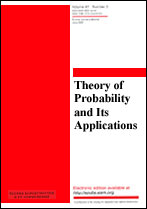|
|
Teoriya Veroyatnostei i ee Primeneniya, 1978, Volume 23, Issue 2, Pages 433–438
(Mi tvp3056)
|
 |
|
 |
This article is cited in 2 scientific papers (total in 2 papers)
Short Communications
«Splitting times» for random fields
I. V. Evstigneev, A. I. Ovseevič
Moscow
Abstract:
There are various results concerning the strong Markov property for one-dimensional processes. The essence of these results can be expressed as follows. For a «good» Markov process $x_t$ and a special class of random times $\tau$ (the so called optional times): a) the behaviour of the process $x_t$ before $\tau$ and its behaviour after $\tau$ are conditionally independent given $\tau$, $x_{\tau}$; b) the forecast of the process' behaviour after $\tau$ based on known $\tau$, $x_{\tau}$ is quite the same as if $\tau$ be non-random (this forecast is determined by the transition function $p(\tau,x_{\tau},s,\Gamma)$).
Williams and Jacobsen introduced a class of random times $\tau$, the so called splitting times, for which property a) only is valid. In this paper, the concept of splitting time is generalized for random fields.
A random field is defined as a system of $\sigma$-algebras $\{\mathscr F_V\}$, $V$ being a closed subset of a finite-dimensional Euclidean space $X$. The Markov property means that $\mathscr F_V$ and $\mathscr F_W$ are conditionally independent given $\mathscr F_{V\bigcap W}$ provided $V\bigcup W=X$. A random time is a pair of random closed sets $V$ and $W$ such that $V\bigcup W=X$. Given $\tau=(V,W)$, we introduce the $\sigma$-algebras of the «past» $\mathscr F_V$, the «future» $\mathscr F_W$ and the «present» $\mathscr F_{V\bigcap W}$. A random time $\tau$ is called a splitting time if the past and the future are conditionally independent given the present. We give necessary and sufficient conditions for a random time with countably many values to be splitting and find sufficient conditions in the case of uncountably many values.
Received: 23.09.1976
Citation:
I. V. Evstigneev, A. I. Ovseevič, “«Splitting times» for random fields”, Teor. Veroyatnost. i Primenen., 23:2 (1978), 433–438; Theory Probab. Appl., 23:2 (1979), 415–419
Linking options:
https://www.mathnet.ru/eng/tvp3056 https://www.mathnet.ru/eng/tvp/v23/i2/p433
|


| Statistics & downloads: |
| Abstract page: | 182 | | Full-text PDF : | 74 |
|




 Contact us:
Contact us: Terms of Use
Terms of Use
 Registration to the website
Registration to the website Logotypes
Logotypes








 Citation in format
Citation in format 
